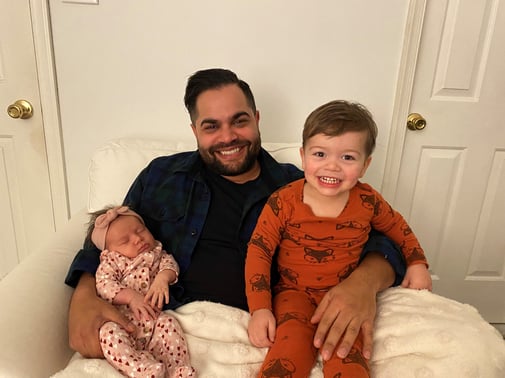Paternity leave is defined as "a period of time that a father is legally allowed to be away from his job so that he can spend time with his new baby." Unfortunately, many dads in the U.S. do not have access to or can’t afford to take time off during this important period in their child's life.
The United States is the only developed country that does not offer nationwide paid paternal leave. In most states, expectant and new fathers are entitled to 12 weeks of unpaid leave. Only five U.S. states have laws that mandate paid parental leave (New York, California, Rhode Island, New Jersey, Washington, and Washington D.C.), leaving many fathers cut short their leave for economic reasons or fear of career setbacks. It is up to individual companies to offer some type of compensation for dads.
I am grateful to work for a company that offers two weeks of paid paternity leave, compared to the one week of paid time off the average company in the U.S. offers. I'm excited to share how meaningful these two weeks were for my family and me and how a compassionate employer and team can truly make a difference.
The Importance of Paternity Leave
We can all agree that paternity leave is necessary, but how important is it? This type of leave comes with a positive or negative ripple effect that affects families, baby (fathers, spouses, other children), and employers (productivity, retention, etc.).
Newborns require their parent’s undivided attention for the first two years of their lives. However, the first several weeks of their lives are crucial for father and baby bonding. During this period, they learn who mom and dad are and develop a special bond with each of them. According to studies, baby and father bonding can change the trajectory of their lives. Physical contact and showing your baby you’re there for them will help them with their cognitive and social development. However, doing the opposite can lead to adverse effects such as anxiety, depression, independence, and resilience later in their lives.
Not only does the baby benefit from having daddy time, but the dad will be able to do more around the house, which will deepen his relationship with his spouse. Splitting more chores around the house will give mom a much-needed break and alleviate some of the stress of birthing a child. When returning to work, dad will be able to focus on just that, work. This will instill gratitude towards the employer and allows dads to be more engaged with their work responsibilities, which benefits all parties.
 Ed Maldonado with his newborn, Sophie, and son, Benjamin
Ed Maldonado with his newborn, Sophie, and son, Benjamin
Sophie's First Two Weeks
On December 20th, 2022, my wife, Devon, gave birth to our beautiful seven-pound baby girl, Sophie Rae. From the beginning of the leave to the end of it, I was able to spend quality time with my newborn, my two other children (9 & 2 years old), and my spouse. Stress was alleviated by the support we were able to give one another.
My wife and I divided responsibilities between our newborn Sophie and two-year-old Benjamin during the day. However, it becomes more challenging at night, and a little strategy is applied. My wife nurses Sophie and everything that comes with having a newborn, changing diapers, pumping, rocking the baby to sleep, etc. On the other hand, I looked after our two-year-old, who decided to compete with his new sister as to who could keep Devon or me up at night the most.
At the lovely hour of 5 am, my son Ben likes to wake up; I change his diaper, listen to the news and give him warm milk while making strong coffee to energize Devon and me during the day. Around 9 am, Devon gets up to feed the baby and immediately pumps herself with caffeine to deal with the baby punches as they come.
Parental Leave at Yoh
From the leave approval process to returning to work, this has been one of the smoothest processes I’ve experienced in the professional world. It only took an email to start the approval process and one phone call to start it when my baby was born.
While away on leave, my team divvied up my responsibilities, so I didn’t return to a mountain of work. I can now say that from the day I got back, I could concentrate on what was happening versus working on accumulated work from weeks past.
As a Yoh employee, my wife, Devon, is able to spend quality time with Sophie during her paid maternity leave. Yoh's enhanced maternity leave benefit provides mothers with up to 12 weeks of fully paid time off.
I cannot express enough gratitude to the Day & Zimmermann team, who made this possible for Devon and me. I’m lucky to be one of the few fathers granted paid paternity leave in the United States and not have to worry about work responsibilities while away. My experience has been eye-opening, and now I’m more aware of the positives that come with paid paternity leave and can be a better advocate for my organization. Thank you to my team, who were there for me every step of the way! Thank you, team!



